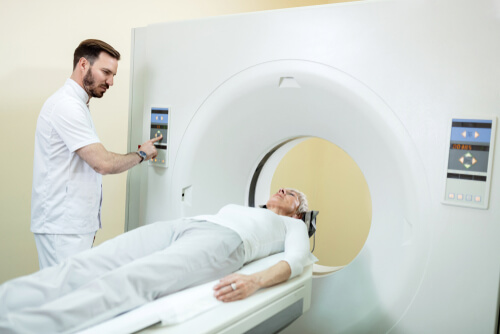Dementia is a frightening diagnosis to receive, but getting a diagnosis is essential to getting the right support. Dementia tests can help you to get a clear diagnosis and plan ahead. They can also identify any other causes of your symptoms.

Page contents
Benefits of getting a dementia diagnosis
Although nobody wants a diagnosis of dementia, having a proper diagnosis of the cause of your symptoms and, if it is dementia, the type of dementia you have, is beneficial.
The symptoms typical of dementia, such as confusion and poor memory, can be other things entirely, like an infection, malnutrition or even depression. These can be treated and your symptoms may go away altogether.
If you do receive a dementia diagnosis, having a diagnosis can give you access to therapies and medication to help your symptoms. You can also make arrangements for your future, such as appointing a Power of Attorney and planning your future care.
How to get tested for dementia
If you have been having symptoms that you think may be early signs of dementia, it’s important to go to your GP. They can use your medical history, the screening tests described below and refer you for more specialist testing if necessary.
Your GP and other medical professionals will be able to guide you through the testing process and signpost you to the next steps. Below are some of the dementia tests you might have.
Blood and urine tests
Usually the first stage of testing for dementia is blood and urine tests. These are to rule out any other, treatable conditions that may be causing your symptoms.
Your GP will collect blood and urine samples from you and test them for:
- Impaired function of your kidneys, liver and thyroid. These can be indicative of …
- Infections
- Vitamin deficiencies
- High blood sugar
Cognitive tests for dementia
Cognitive tests (also called mental ability tests or cognitive assessments) examine your mental ability. They are performed by a medical professional who will ask you questions and make notes on a form.
Cognitive tests are looking for any signs of impaired brain function, including trouble with your memory, problem-solving, reasoning and orientation. They are not an intelligence test; the questions are straightforward.
At the end you get a score, which gives an initial indication of what areas you are having difficulty in and what the next steps of your assessment might be.
General Practitioner Assessment of Cognition (GPCOG)
The GPCOG is a screening test conducted by your GP. It is a brief question and answer test to see if your brain function might be impaired.
Your GP will ask you a few questions related to memory and orientation, such as:
- What is the date today?
- Can you tell me what’s going on in the news lately? Here they are looking for a specific news item that happened in the last week, such as ‘Donald Trump visited Windsor Castle’.
- Can you draw a clock face in the circle on this piece of paper? Can you draw the hands to show twenty past six?
- Can you remember the address I told you five minutes ago?
They will also ask you a few informal yes/no questions about how you feel your mental abilities have changed in the last 5-10 years, including:
- Do you have more difficulty remembering things that have happened recently?
- Do you have more trouble remembering conversations from a few days ago?
- Do you have more difficulty finding the right words to express what you’re trying to say?
- Are you having any more problems with managing your finances?
- Are you any less capable of managing and administering your medication?
- Do you need any more help with using public transport or driving?
At the end, your score will show if you have any cognitive impairment that might need further testing.
Six Item Cognitive Impairment Test (6CIT)
The 6CIT is a short, six question test that is widely used by the NHS.
The questions are:
- What year is it?
- What month is it?
The medical practitioner will then give you a short address to remember.
- What time is it (to the nearest hour)?
- Can you count backwards from 20 to 1?
- Can you tell me the months of the year in reverse?
- Can you repeat the address I told you earlier?
The 6CIT test looks for rudimentary signs of cognitive impairment. The score you get at the end will show either no, mild or significant cognitive impairment.
What is the ’30 questions’ test for dementia?
The 30 questions test for dementia refers to the Mini Mental State Examination (MMSE). Like the 6CIT and GPCOG tests, the person is asked a series of questions (30 in total, surprisingly). The higher they score, the less likely they are to have cognitive impairment. It’s not used to diagnose dementia in itself, but rather to give an initial idea of a person’s cognitive ability and recommend the next steps towards diagnosis.
Other cognitive tests
There are a few other tests that medical professionals might use to screen you for cognitive impairment.
- Montreal Cognitive Assessment (MoCA) – This is similar to the GCOG and 6CIT in purpose, length and structure.
- Addenbrooke’s Cognitive Examination III (ACE III) – This is a more comprehensive test.
Brain scans for dementia
If cognitive tests indicate you may need a brain scan, you will likely have one or more of the scans listed below. Each can identify different issues that may be causing your symptoms and aid in diagnosing which type of dementia you have (if you have it).
Magnetic Resonance Imaging (MRI) scan
A brain MRI scan involves lying with your head in a large tube which scans your brain. It can be noisy, but it doesn’t hurt. You have to lie still for about 20 minutes.
The scan takes images of your brain. From these images, doctors can see any shrinkage of your brain, damage to your blood vessels, as well as tumours or inflammation. Being able to see where damage is in the brain is a key part of your diagnosis, as different types of dementia affect different areas of the brain.
Positron emission tomography (PET) scan
In a PET scan, you are injected with a liquid called a ‘tracer’, which is radioactive. You then go into the PET scanner. This is a flat bed that moves back and forth through a short tube. The whole process takes up to an hour.
The PET scan can create images of any build up of amyloid or tau protein in your brain. These are the cause of Alzheimer’s Disease.
Computed tomography (CT) scan
If you have a CT scan, you will lie on a bed with your head in a short tube. This will scan your brain and may be noisy. You might have to drink or be injected with a contrast dye before this. CT scans are much quicker than PET or MRI scans, usually only a few minutes long.
A CT brain scan can identify if you have had a stroke or haemorrhage in the brain, and any blood clots or damage to blood vessels. These can be a cause of dementia, particularly vascular dementia. Doctors are also able to treat any blood clots to prevent further damage.
Single-photon emission computerised tomography (SPECT) scan
Before a SEPECT scan, you will be injected with a liquid that contains dye and radioactive substance. You will then lie under a scanner as it takes images of your brain.
The SPECT scan looks at the blood flow in your brain and anything that may be interfering with it, such as burst vessels or blood clots. Unlike CT scans, SPECT scans can enable doctors to create 3D images of your brain.
Electroencephalography (EEG) scan
In an EEG scan, you have small electrodes stuck to your head. It doesn’t hurt and they come off straight afterwards, but you may need to wash your hair a couple of times.
The EEG can record your brain’s electrical activity through the electrodes. It is particularly helpful if you experience any seizures and can help diagnose the type of dementia you may have.
Genetic testing for dementia
If a large number of people in your family have or had dementia, your doctor may decide to refer you for genetic testing.
The test is just a medical professional taking some DNA, such as a swab of your saliva or sample of your blood, which will then be sent away to be tested.
Genetic testing for dementia can be used to diagnose dementia, if the type of dementia you have is caused by a single-gene change. It can also be used to predict a person’s likelihood of developing dementia that is caused by a single-gene change.
Types of dementia that can be caused by singe-gene changes include Familial Alzheimer’s Disease, Familial Frontotemporal Dementia and Familial Vascular Dementia.
Detection for those at risk of dementia
There is ongoing research to detect risk factors of dementia before the condition develops. Foodforthebrain.org, the UK’s Alzheimer’s prevention charity, was selected by Innovate UK, the Government’s research and innovation agency, to develop and then roll-out to the NHS a reliable test to help identify those at risk of dementia.
The result is their free online Cognitive Function test. It has been taken over 200,000 times and you can take it right now.
Dr Cynthia Bullock, Director, Healthy Lives at Innovate UK, said: “Digital cognitive assessments have the potential to transform how we detect and diagnose dementia, making it faster, more accurate, and accessible to more people. By supporting these projects, we’re not only driving innovation into NHS settings, but also helping reduce long-term care costs and improve outcomes for patients and families across the UK.”
“This project marks a step-change in how we approach dementia,” said Emma George, CEO of the Food for the Brain Foundation. “With Innovate UK’s support, we can validate the Cognitive Function Test within the NHS and move closer to a future where true prevention, by protecting brain health, is routine and accessible to all.”

